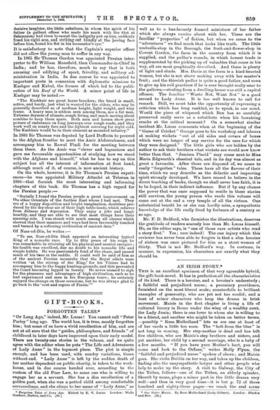GIFT-BOOKS.
FORGOTTEN TALES.*
"OF Long Ago," indeed, Mr. Lucas ! You cannot call "Peter Parley" long ago. The world has, it is true, mostly forgotten him; but some of us have a vivid recollection of him, and are not at all sure that the "guides, philosophers, and friends" of childhood in later days have improved upon their early model. There are twenty-one stories in the volume, and we quite agree with the editor when he puts "The Life and Adventures Of Lady Anne " in the topmost place. The plot is simple enough, and has been used, with sundry variations, times without end. "Lady Anne" is left by the sudden death of her mother dependent on public charity, is taken to the work- house, and in due course handed over, according to the custom of the old Poor Law, to some one who is willing to engage her as a servant. She has a dim recollection of a golden past, when she was a petted child among comfortable surroundings, and she clings to her name of "Lady Anne," as • Forgotten Thies of Long Ago. Edited by E. V. Lucas. London : Wells Gardner, Darton, and Co. [68.3 well as to a handsomely framed miniature of her father which she always carries about with her. These are the familiar " properties " of fiction, but when we come to the " adventures " we find much that looks like truth. The little umbrella-shop in the Borough, the fruit-and-flower-shop ill Covent Garden, the farm in the country from which it is supplied, and the pedlar's rounds, in which honest trade is supplemented by the picking up of valuables that come in his way, all are most graphically described. And there is plenty of light and shade. Mrs. Davis at the farm is a kind-hearted woman, but she is not above making away with her master's fruit ; and the thievish pedlar is quite a good father, and vows to give up his evil practices if be is ever brought really near to the gallows,,—stealing from a dwelling-house was still a capital offence, The familiar "Waste Not, Want Not" is a good second to Lady Anne. It is too well known to call for remark. Still, we must take the opportunity of expressing a criticism which has long rankled, so to speak, in our mind. Would the piece of whipcord which Ben has so carefully preserved really serve as a substitute when his bowstring cracks at the critical moment ? On a somewhat similar incident Mr. Lucas comments when at the beginning of the "Game of Cricket" George goes to his workshop and labours at making wickets "out of old sides and covers of boxes which were no longer of any service for the uses for which they were designed." The little girls who are bidden by the author to ask their brothers what wickets are would now know better than that. "Jemima Placid" may come next to Miss Maria Edgworth's classical tale, and in its day was almost as great a favourite. After these are disposed of, we come to really "forgotten" tales. These have all the flavour of their time, which we may describe as the didactic and improving spirit strongly developed. We have ceased to believe in the direct teaching of books, though we shall never lose faith, it is to be hoped, in their indirect influence. But if by any chance the power that was once supposed to reside in these stories still survives, the young person who reads this volume will come out at the end a very temple of all the virtues. One substantial benefit be or she can hardly miss, a sympathetic knowledge of the life really lived by forbears of a century or so ago.
Mr. F. D. Bedford, who furnishes the illustrations, deserves the gratitude of readers scarcely less than Mr. Lucas himself. He, as the editor says, is "one of those rare artists who read a story first." Yes ; rare indeed! The one injury which this reviewer has never been able to forgive is that a slim heroine of sixteen was once pictured for him as a stout woman of thirty. That is not Mr. Bedford's way. In costume, in manner, in expression, his characters are exactly what they should be.






























































 Previous page
Previous page